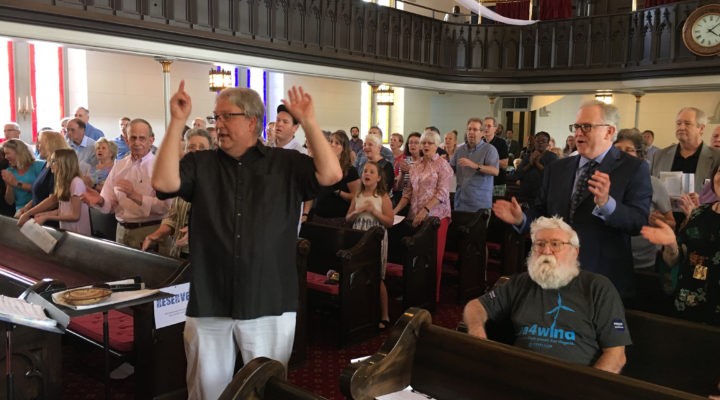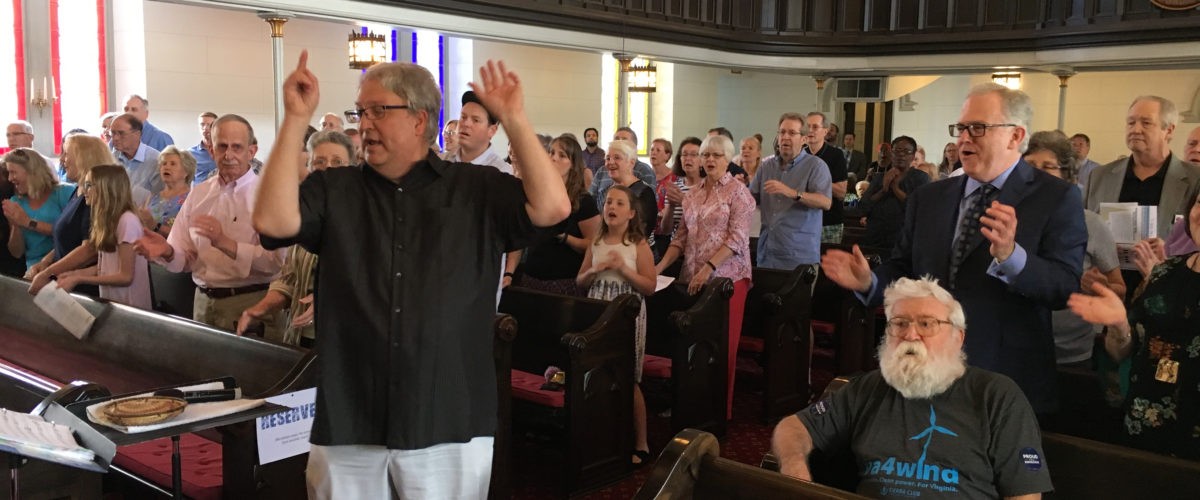Bob Shoup looked around the oaked and ancient sanctuary of Freemason Street Baptist Church on a hot, spring Sunday afternoon unsure of who might show up to the concert his Norfolk Street Choir was about to present.
And he was talking about the performers.
Members of the Norfolk Street Choir live with uncertain housing. They live in temporary shelters, friends’ living rooms, cars and apartments. A few have houses and some live under the stars. And their situations likely will be different next month.
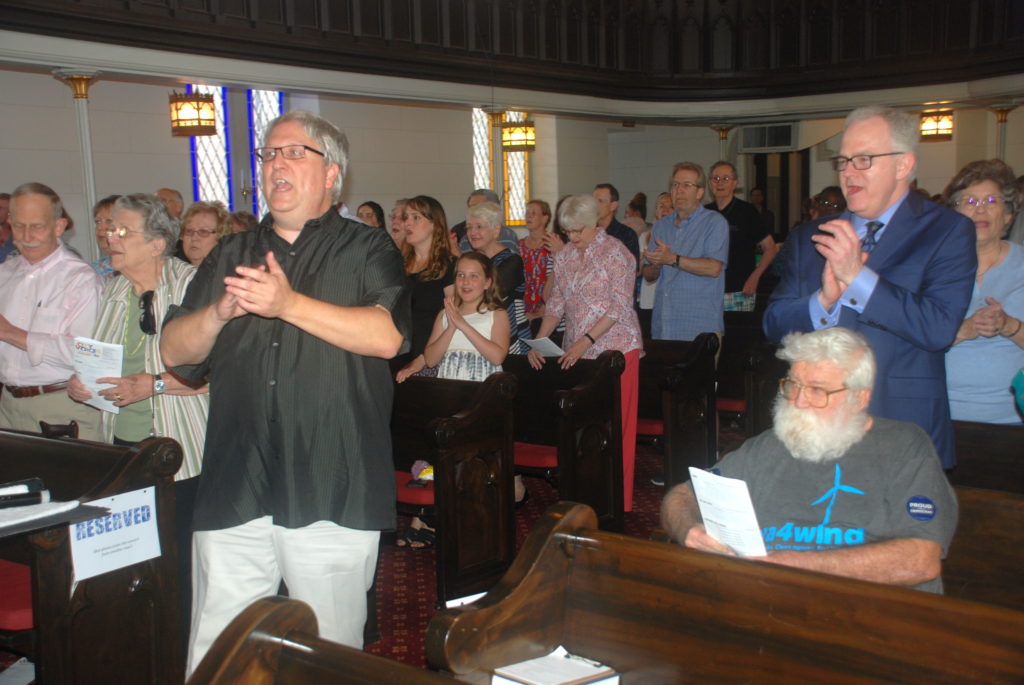
Bob Shoup, left, conducting the Norfolk Street Choir, “had a vision that made this happen,” according to Freemason Street Baptist Church Pastor Bob Guffey, right (in blue tie).
Yet Shoup, minister of music at Freemason Street, a staff conductor with the Virginia Symphony Orchestra for 22 years and leader of the symphony’s chorus, doesn’t gather this disparate group to present a musical revue so a well-heeled audience can feel good that something is being done for “these people.”
Shoup teaches them music. He holds them to a musical grindstone to sharpen their skills. And he infuses dignity. He’s instructive and demanding. And they love it. At their first practice three years ago, he had them laying on the floor, doing breathing exercises.
Warming up for the concert on this May day, he cautions that all their nervous energy “is making you lose control.” He warns them not to let familiarity with “Beautiful City” – which basically has become their theme song – make them sing it with less passion. “You have to sing it like no one has ever heard it before,” he says, right after he told them to move, “like your body has hinges.”
Still, no one would mistake the Norfolk Street Choir concert for professionals. But that’s hardly the point. With this group, rehearsals are in large part the purpose. Performance is a byproduct.
Seventeen show up to present this third annual City Voices concert. For all Shoup knew the night before, he might have had a choir of eight. Or 40.
As many as 60 people from a revolving clientele of 80-90 typically gather for free breakfast each Friday at Freemason Street, the crowd from which Shoup extracts his choir. Drawn by the breakfast, no strings attached, those who stay for choir practice receive a free all-day city bus pass.
Shoup has no way to anticipate the size of the audience either. But by the time the concert starts, the sanctuary of historic Freemason Street church is nearly full. The church, in city center Norfolk, was built in 1850 and designed by Thomas Walter, architect for the U.S. Capitol dome.
The church has a proud tradition of independent thinking, hosting the first public school in Norfolk and opening it to young black children. This summer, it will host a Freedom School, a national six-week intensive program to counteract the typical summer academic drop off.
Audience of one
Kendrick Hopkins Jr., a photographer for local public television station WHRO, introduces the concert, referring to his attendance at an early practice in 2017. Shoup wanted the choir to sing as if performing before an audience. Hopkins was pulled into service that morning, “as an audience of one.”
But, Hopkins said, “it was one of the most beautiful things that ever happened” and it ignited a fever that prompted him to attend and film about 40 practices over the next year on his way to producing a documentary that will premiere Nov. 18. A 10-minute preview of the documentary already has been nominated for a regional Emmy.
Preparing in the chapel before the concert, choir members pull on long-sleeved blue T-shirts with Norfolk Street Choir imprinted over the left chest. Beneath they wear dresses, jeans, slacks and all manner of shoes, but the blue shirts turn them into a group, organized, proficient and proud.
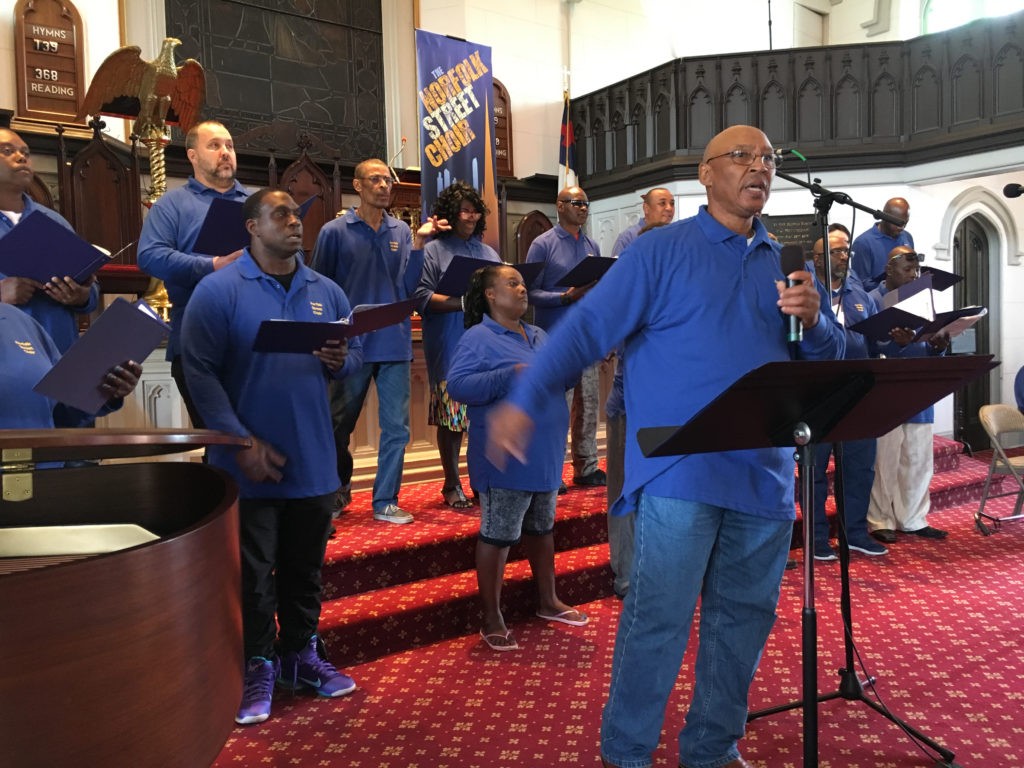
Soloist Willie Johnson leads the Norfolk Street Choir in a rendition of “Fight Song” by Rachel Platten. Part of the chorus declares, “This is my fight song, take back my life song, prove I’m alright song…”
“My wife and I were homeless, down on our luck,” says James Lynch during a reception after the concert. “We started coming to breakfast, not by coincidence, by God’s will. They showed us nothing but love, honor, respect and dignity. Bob is like a father to us. And [Minister to Children and Families Stephanie Van Leeuwen] Miss Stephanie has a caring, loving heart for the community, a loving attitude. In spite of our situation, we get treated equally and fairly.”
Choir member Princess Edge was homeless years ago, sleeping in an abandoned car. Now she serves others experiencing homelessness. “No matter what you’re going through yourself, someone else is going through something worse,” she said.
Mike Reed, who moved to Norfolk when the aunt who raised him in troubled circumstances died, sings “to give back to the community, to show love.”
“God did a 360 [degree turn] in my life and gave me a new suit,” Reed said earnestly. “Norfolk Street Choir is part of that suit. I was homeless when I came to Norfolk. I was a bitter man.”
Confirming that the choir is about much more than performance, singer James said that day’s concert was “a big morale booster. I can’t imagine myself not being in this. I had no self-esteem. Everything I thought was negative, they turned into a positive. The Freemason family is like the only family we have.”
Choir calls pastor
Bob Guffey was a candidate for the Freemason Street pastorate in the fall of 2016 when he witnessed one of the very first street choir practices. “It was like the Holy Spirit lit up the room,” he said. “Terms like family, friend, neighbor were rising vocabulary and this church decided to be church.”
He told his wife, Angie, that if Freemason called, they were coming.
The church had just undergone a visioning process to clarify “How do we neighbor?” in a very mixed, center city neighborhood. That process resulted in a mission statement that says the church seeks “to transform lives by worshipping God, building relationships, developing disciples and serving our neighbors.”
Shoup, who had begun to study the possibility of a street choir, said the church’s sponsorship of such a group met all four clauses of the statement. It was a natural.
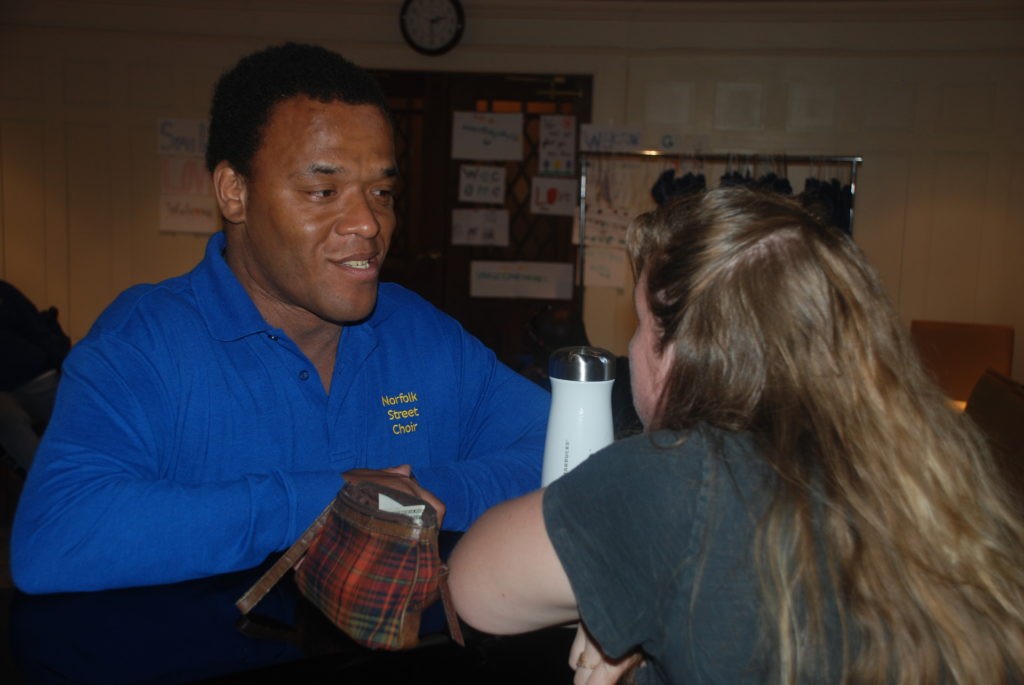
Johnnie Driggins sings in the Norfolk Street Choir just “because I love to sing.” He also writes songs, one of which the choir has performed. He talks with accompanist Amelia Mendonsa before the May 19 performance.
He found the epicenter of choirs in vulnerable communities is Australia, and he connected with choirs in Los Angeles, Atlanta and Dallas. Everyone said it’s important to create a central point to gather a vital mass. Hence, the breakfast.
While Norfolk is a performance rich city, Shoup’s idea for a street choir was never about performance. Rather, it was “to lift spirits and add dignity to human beings, no matter their circumstances.”
In his own ministry at Freemason Street, he has no interest in the church as concert hall. “I want to invoke the creator of the universe on a weekly basis in an atmosphere where people can come into communion with God. I don’t program music to please anybody. I want to support scripture, to support the sermon and to guide you into a special time with God.”
Music has the ability to do that, he said. Just as a mountain top view inspires the heart in ways words cannot explain, music has the innate ability to lift vision to the far horizon.
Communal singing draws forth “beauty beyond ourselves that we get to see, get to participate in,” he said. Special groups like the street choir amplify that beauty among people for whom “experiences of beauty are harder to come by.”
Shoup is so serious about his responsibility to connect worshippers to God, that he led a seven-year project for the church to create its own hymnal – not some photocopied sheets of music – a hardbound hymnal with 461 titles.
Given the church’s progressive nature, Shoup felt too many songs in hymnbooks off the shelf contained archaic language, restrictive gender references and “condescending and horrible” perspectives on missions.
Most of the hymns included in The Hymnal of the Freemason Street Baptist Church underwent some text editing. One example is the line in “Hark! The Herald Angels Sing” in which the committee changed “born to raise the sons of earth” to “born to raise each child of earth.” Simple, but powerful.
As a church that stands for racial equality, refugee care, the poor and the status of women, Shoup said the hymnal project was “a good opportunity to make a faith statement.” The church left the Southern Baptist Convention in 1993 and affiliates with the Cooperative Baptist Fellowship.
“Church music connects us with believers in other times and places,” Shoup said. “Every musician who writes to music composed by somebody else is by its nature choosing to engage in somebody else’s story. When we perform Mozart, I’m engaging with a guy who lived a couple centuries ago. A choir works together to tell the story the writer created. A greater thing is happening here than me, but somehow, I’m still beautifully connected to it. It’s beautifully communal.”
Everybody has a story, Shoup told those attending the City Voices concert. A man experiencing homelessness might see the nice shoes of a person on the street and believe that person has an easy, together life. The person in shiny shoes might see the man on the street and believe he is without hope. Likely, both are wrong.
Shoup tells his choir that he learns from them every week. He learns tenacity, vulnerability, transparency, encouragement. Just getting to choir with failing knees, no bus pass, health issues and avoiding the occasional push by authorities to sanitize the city of them, demonstrates commitment.
One choir member rode a bus all the way downtown just to tell Bob he couldn’t sing as he had promised because he had to take on an extra shift at work. Then he rode the bus back.
“You sing about perseverance,” he tells his choir. “You have the power to deliver that message in a way I never could.”
Shoup’s enthusiasm for the Norfolk Street Choir has led him to help start a national organization called the National Association for Music in Vulnerable Communities (NAFMVC).
Virtually every Friday someone from city government is on site, as the Freemason Street breakfast has become a central gathering place for people to see their caseworkers, get information and learn how to navigate the system.
Stephanie Van Leeuwen even is getting certified to do intake work for the city on a volunteer basis, an important development as the city is cutting a department that was dedicated to the homeless population.
“Friday mornings are really good for me,” said Shoup. “It’s a privilege to be in the midst of this group. A visceral connection to our personhood can be lifted up by what music can do. Who wouldn’t want to be around that?”
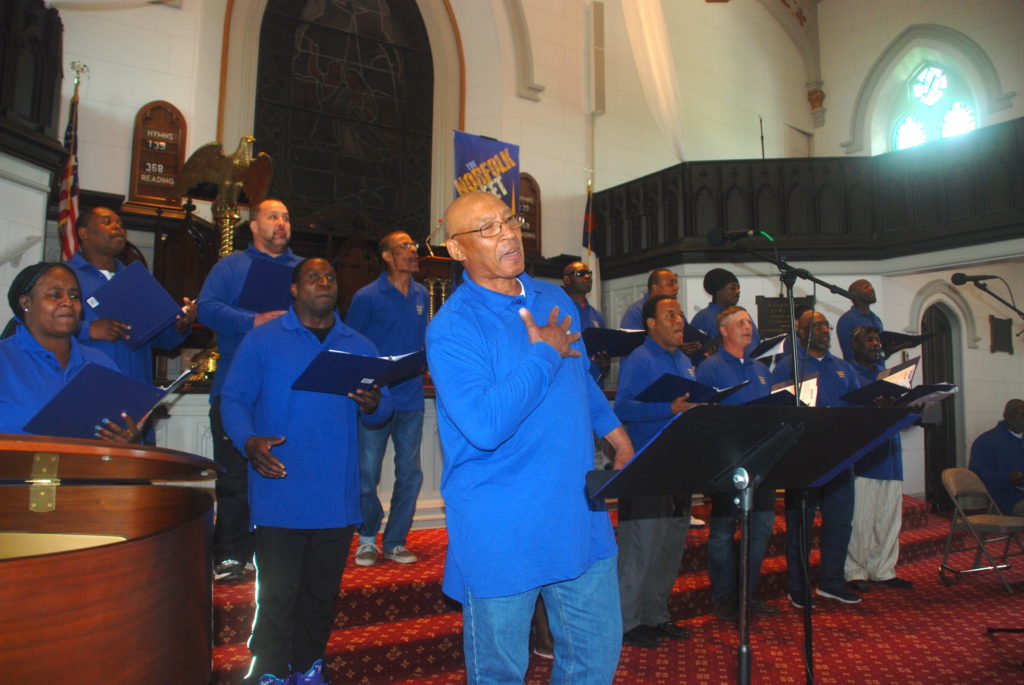
“Heaven Help Us All,” sings soloist Willie Johnson with the Norfolk Street Choir. “Keep hatred from the mighty and the mighty from the small,” it goes. “Heaven help us all.”
Read more in the Norfolk Street Choir series:
Norfolk Street Choir infuses dignity with a dose of music
Photo Gallery: Norfolk Street Choir
Related commentary at baptistnews.com:
Making God smile through music | Doyle Sager
Too busy to sing? Try anyway | Brett Younger
Related news at baptistnews.com:
Songwriter sees ‘good news’ in declining role of church music
Brian McLaren: It’s time to re-write pro-war hymns
This series in the “Singing Our Faith” project is part of the BNG Storytelling Projects Initiative. Music is integral to our faith but some individuals and congregations take this expression of ourselves to a new level. In “Singing Our Faith,” we explore this relationship between music and faith and the creative ministers, church leaders and congregations leading the way.
_____________
Seed money to launch our Storytelling Projects initiative and our initial series of projects has been provided through generous grants from the Christ Is Our Salvation Foundation and the Eula Mae and John Baugh Foundation. For information about underwriting opportunities for Storytelling Projects, contact David Wilkinson, BNG’s executive director and publisher, at [email protected] or 336.865.2688.

